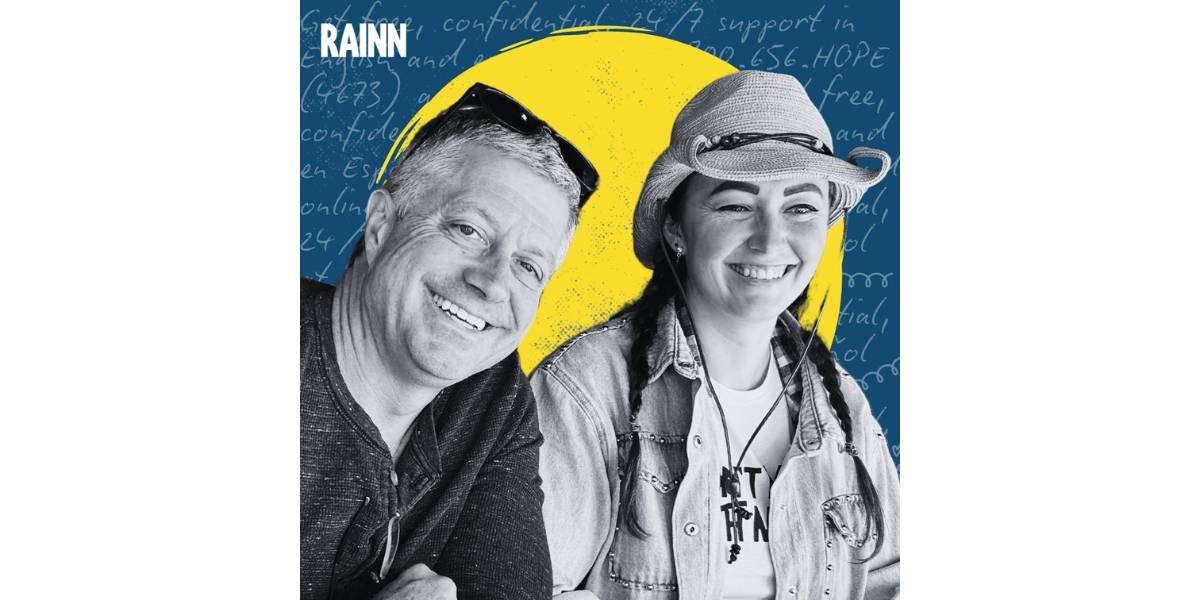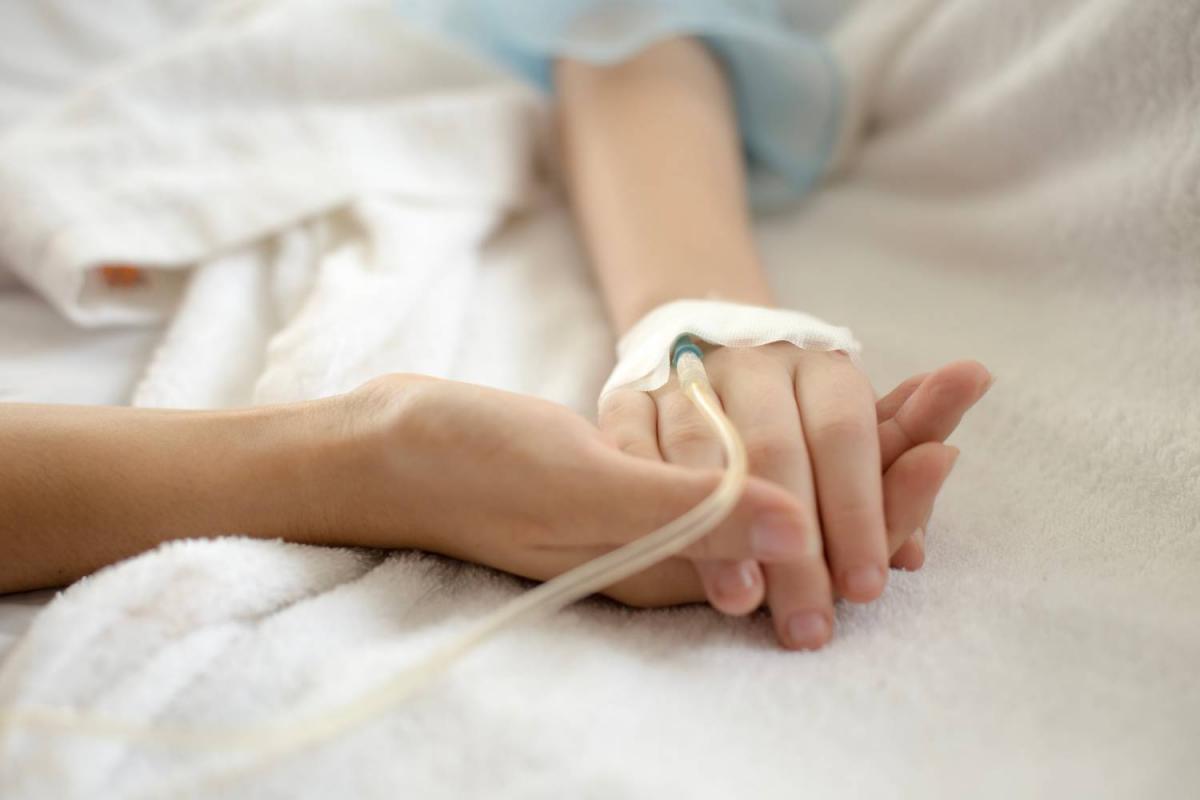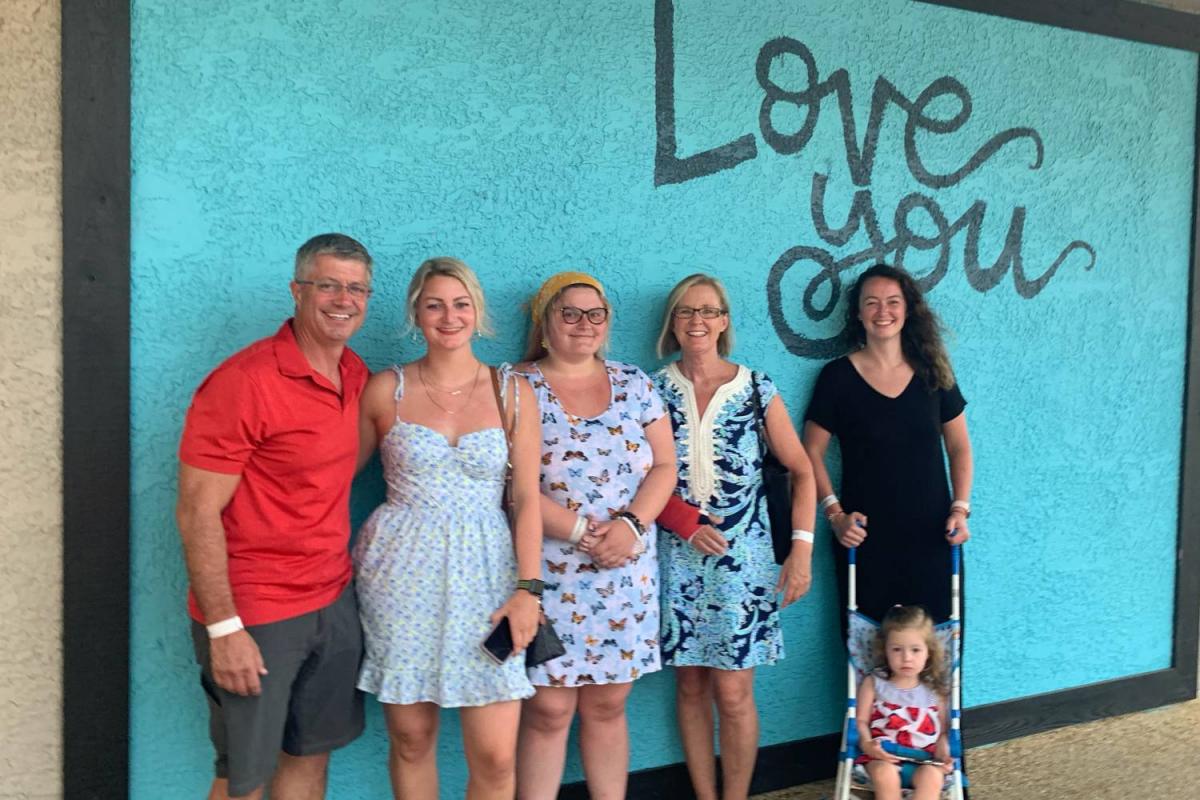After an international crime of sexual violence sent shockwaves across the Atlantic, this father made a promise: “We will get justice, one way or the other.”
Content Note: This story contains non-explicit descriptions of a survivor’s experience with drug-facilitated sexual assault. The survivor, Kaitlin, chose her father, Derrick, to share her story with RAINN.

When Derrick and his wife, Jill, settled their daughter into her apartment overlooking the bright blue Caribbean Sea, they weren’t the least bit worried.
The close-knit family had vacationed on the tiny island of Antigua several times and had full confidence in the U.S.-accredited nursing college 22-year-old Kaitlin had chosen.
“It was very rustic for a nursing college, but that was what Kaitlin wanted,” Derrick explained. “She wanted to be a travel nurse—a missionary nurse. She wanted to get out in the world and help people.”
Kaitlin had no way of knowing that she’d become one of the 13% of college students who experience sexual violence or that her dad, Derrick, would embark on a nearly six-year journey to obtain the justice his daughter deserved.
Part 1: The Assault
On May 23, 2015, at the start of her second year of nursing school, Kaitlin went on a date with a Tinder match. Lee Martin-Cramp was a constable with London’s Metropolitan Police Service, and he was visiting Antigua for a wedding. The photos he sent to Kaitlin showed him wearing his police uniform and playing soccer with kids.
Kaitlin and Lee met for their date in a public place where they talked, shared some wine, and explored the island’s vibrant waterfront before strolling to Kaitlin’s nearby apartment with its beautiful balcony views. As daylight waned and the mosquitoes swarmed, the two relocated indoors to watch a movie.
In the small, secure apartment her parents had helped her choose, Kaitlin poured two glasses of wine, then briefly left Lee alone in her living room. She would return and sip her wine several minutes later, remarking that it tasted strange. She would become suddenly dizzy—extremely dizzy.
Aside from two violent flashes of memory, she wouldn’t remember anything else about that night.
Less than 24 hours later, in Maryville, Tennessee, while Derrick and their two youngest daughters watched television, Jill left the room to answer a Skype call from Kaitlin.
“We could hear Kaitlin sobbing through the laptop,” Derrick remembered. “Everything changed in that moment. Everything changed for all of us.”
Part 2: Trusting the System
Derrick and Jill immediately instructed Kaitlin to call the police and go to the hospital for a Sexual Assault Forensic Exam (SAFE).
Inexplicably, when Kaitlin met the senior sexual assault detective at the island’s central hospital, he turned her away. (“Rule number one,” said Derrick, “never turn away a victim who comes in for a rape kit.”)
Meanwhile, Kaitlin was determined to learn exactly what had happened to her. Despite overwhelming physical and emotional trauma, she casually resumed texting with the man who had assaulted her, hoping he would reveal the truth.
Her persistence paid off. After repeated denials, Martin-Cramp eventually admitted in a text message that he’d “had sex” with Kaitlin.
Then he boarded a flight back to Heathrow and blocked Kaitlin’s number.
Days later, with her mom, Jill, now by her side, Kaitlin returned to the hospital, where a doctor finally performed a SAFE exam in the presence of a female police officer.
Extensive, infected internal injuries revealed to the medical team what Kaitlin already knew: she had been raped.

Two people hold hands in a hospital. (Getty Images Pro)
“He can't continue to be a policeman.”
With the perpetrator’s texted confession, a damning medical report, and an official police report finally filed, Derrick felt certain justice would be swift. He couldn’t have been more wrong.
First, a Foreign Service Officer at the U.S. consulate instructed them to not contact the U.S. embassy. “They’ll run roughshod over the local police, and then the police won’t help you,” the officer explained.
Even worse was the Senior Detective’s cold response to Jill after she demanded a full police investigation: “Nothing is going to come of this,” he said. “We don’t extradite.”
“I kind of lost it,” Derrick remembered. “I thought, NO. We're not just going to let this happen.”
But Kaitlin’s primary concern had nothing to do with herself. “What are we going to do about this?” she asked her dad. “He can't continue to be a policeman.”
“She was already thinking beyond herself,” Derrick said admiringly. “She’d realized that he’d used his position as a police officer to gain her trust. And when someone does something like that, it's not a one-time behavior. We knew it had to be a pattern.”
So Derrick made his oldest child an offer—and a promise.
“I promised Kaitlin that if she’d focus on getting well and getting her degree, I would follow the justice path. I promised that we would get justice, one way or the other. I told her that I would update her on everything, good or bad, and that all of her communication with the police would go through me.”
Kaitlin didn’t hesitate. “Okay,” she said. “Let's do it.”
"You've got a police officer who's a predator."
Suddenly, Derrick’s sleepless nights had a purpose.
He stayed up late learning about the Sexual Offences Act of 1995, then he discovered Antigua’s extradition treaty with the U.K. “The law was clear," Derrick said. "There was no reason Antigua couldn’t extradite a rapist from the U.K.”

A beach in Antigua. (Lunamarina)
He connected with Antigua’s Commissioner Robinson, a top-level law enforcement official who fully supported Derrick's plan to pursue extradition. Next, Derrick located the number for the oversight division for London’s police department.
“I told them outright, ‘You've got a police officer who's a predator.’ "
Under Derrick’s insistent pressure, the wheels of justice were beginning to turn.
Part 3: A Nice, Normal Family
Nothing in Derrick’s upbringing, education, or experience had prepared him for an international fight for justice.
Growing up in tiny Mount Gilead, North Carolina, Derrick and his brother were typical kids with loving, hardworking parents. After graduating from North Carolina State University, he married his college sweetheart, Jill. With their three daughters in tow, the couple traveled the world for Derrick’s career in retail technology. “We caught the travel bug when we lived in Thailand, and we can't shake it,” he said. “Travel shifts your perspective.”
After the family of five returned to the U.S. and settled in Eastern Tennessee, Derrick and Jill enrolled Kaitlin, Emily, and Taylor in a Christian school and bought a house with a swimming pool for hosting the girls’ friends.
“We just tried to teach 'em to be good people,” he said. “We wanted them to understand that love is important. To treat people the way you want to be treated. Because once they leave home, you don’t know what they're gonna go through. And sometimes, that foundation is what pulls them back.”
"Extraditions take a long time."
Government officials in both countries agreed on one thing: “Extraditions take a long time.” True to form, the first extradition request got lost—twice.
Submitted just before Christmas 2015, the first request vanished into thin air somewhere between London and Antigua. A subsequent extradition request was submitted (and received) after the new year, but by April 2016, progress had stalled completely.
Derrick finally turned to LinkedIn to find someone—anyone—who might be able to resurrect Kaitlin’s case. Eventually, one Antiguan official expressed willingness to help; they located the missing paperwork in a pile of documents on someone's desk.
Still, the British court denied the extradition request, citing “no running water, no electricity, and extreme overcrowding” in Antigua’s prisons. Now, Derrick and the Antiguan officials needed to identify new prison accommodations and submit revised extradition paperwork to the U.K.
Months dragged by.
“Now—it's time to call the U.S. embassy.”
Kaitlin graduated from nursing college and accepted a job at a hospital in Tennessee, near her family—somewhere she felt safe. Derrick increased his pressure on Antiguan officials. “I couldn’t let it sit on somebody's desk for too long or it was going to die, so I was constantly on the phone with the folks in Antigua,” Derrick explained.
“I've been in their offices. I took Kaitlin there before she graduated so they could see her in person. I wanted to make it even just a little bit harder for them to ignore her case.”
As the calendar turned to 2018, Derrick again called on his Antiguan ally, Commissioner Robinson. “Nothing is moving. What do I do now?” And for the first time since the ordeal began, he was told: “Now—it's time to call the U.S. embassy.”
Officials at the U.S. embassy were stunned to learn what Derrick had accomplished over the previous two and a half years, and they connected Derrick with Sarah Abraham, a U.K. embassy official who negotiated the final extradition terms. “Sarah literally interrupted a parliament session to get the prime minister’s sign-off on the extradition,” Derrick told us. “She's kind of a badass.”
On September 26, 2018, 40 long months after Lee Martin-Cramp assaulted Kaitlin, the U.K. extradited him to Antigua to stand trial.
It was the first time Antigua had ever extradited a defendant from a non-Caribbean country.

An empty jury box in a courtroom. (Getty Images Signature)
Part 4: The Trial
When the trial began on May 23, 2019, Kaitlin’s side of the courtroom buzzed with anxious anticipation. Along with her family, Kaitlin’s supporters included the many officials, allies, and survivors whose advocacy had helped move her case through the justice system.
Martin-Cramp’s side of the courtroom, however, was empty.
“His mother and girlfriend visited him the week before the trial, but he didn't want them at the trial itself,” Derrick said. “All I can think is that he didn't want them to hear the truth.”
Antiguan courts allow defendants to give a statement “from the box,” meaning the perpetrator gets to tell his version of the story without being sworn in or cross-examined.
“He kept saying that [what he did to Kaitlin] was all just for fun,” Derrick recalled. “But later, when the medical examiner took the stand and described Kaitlin’s injuries, it was clear that there was nothing “fun” about what he’d done.”
Despite the evidence, Kaitlin and her supporters knew the odds of securing a conviction were not good. “We’d seen too many statistics. The system is not designed to work in a victim’s favor,” said Derrick. “The trial was brutal, with the defense blaming Kaitlin and asking her questions like, ‘What were you wearing?’ But Kaitlin was incredible on the stand.”
In one final call for justice, the prosecutor delivered a powerful closing statement that evoked images of a spider pulling its prey into a web. “It was absolutely masterful,” Derrick raved. “But then the jury left to deliberate, and the tension skyrocketed.”
"They have a verdict!"
As the jury of 12 deliberated, Kaitlin’s family and their supporters gathered in a private room. Derrick and Kaitlin paced around the courthouse complex, burning nervous energy and clinging to hope.
At the two-hour mark, a voice called out: “They have a verdict!”
“You can’t imagine the adrenaline rush,” Derrick said. “Everyone was frantic, trying to grab their stuff and get back into the courtroom.”
The jury entered. The judge entered.
And four years to the day after Lee Martin-Cramp drugged and raped Kaitlin, an Antiguan jury gave their unanimous verdict:
Guilty.
“Kaitlin and I just stood there hugging for a really long time," Derrick said. "It had been me and her fighting this for four years, while she finished school and got her first hospital job. All along, Kaitlin never stopped believing.” Derrick shook his head and sighed deeply. "He picked the wrong victim—the wrong family.”

Left to right: father Derrick, daughters Taylor and Emily, mother Jill, and daughter Kaitlin with her child.
Part 5: The Sentencing
On the family’s post-trial flight back to Tennessee, Kaitlin turned to her dad and said, “I didn't do anything wrong, and I'm not going to hide anymore.”
The story of the London cop accused—now convicted—of rape had been big news in England, but U.S. media hadn’t given the crime a second look. So, six weeks later, Kaitlin and her family welcomed a team from CNN into their Tennessee home for the virtual sentencing hearing.
As the CNN crew watched from the side, the family dialed into the court proceedings. The victim impact statements, which had been read in Antigua after the conviction, were read again. Statements from Kaitlin, her family, and even a U.K. police officer highlighted the extensive harm Martin-Cramp had caused.
From the U.S., Antigua, and England, onlookers held their breath as the judge sentenced Martin-Cramp to 15 years in prison with 11 years of mandatory confinement. He will be eligible for parole in 2029.
"He got me, too."
After CNN published her story, Kaitlin began receiving messages from survivors worldwide—personal expressions of gratitude and encouragement. One day, she opened her Facebook inbox to a direct message from an unknown English woman. The sender wrote, “He got me, too. I just didn't come forward.”
In 2021, almost six years after Martin-Cramp assaulted Kaitlin, the Privy Council rejected his second and final appeal. It was finally over.
Part 6: The Work
Years before, in 2015, Derrick’s initial research had led him to RAINN’s website and 24/7 hotline, 800.656.HOPE (4673).
“The folks at RAINN did everything they could to help us,” he described. “They reached beyond U.S. borders and contacted every group that looked like they could help.” Those early interactions with RAINN helped inspire Derrick to embrace full-time advocacy work.
“I left my job in 2023, and my whole mission is to help RAINN and other NGOs that are tackling sexual assault issues,” he said.
“Sexual assault happens every 68 seconds in the U.S. alone, so we have a lot of work to do,” he noted—a sentiment his entire family shares. “My middle daughter, Taylor, is a sexual assault detective in Nashville, and my youngest daughter, Emily, does criminal background investigations for the government.”
As for Kaitlin, she’s now a successful cardiac nurse raising a young daughter in the Tennessee community where she grew up. Her life and the lives of her family were forever altered by the sexual violence she survived, but countless others will benefit from Kaitlin and Derrick’s persistent pursuit of justice.
“Antigua had never done anything like this before,” Derrick said. “Future cases will move a lot faster because we laid the groundwork.”
To any survivor considering disclosing an assault experience to the justice system, Derrick advised, “Get educated. Learn as much as you can about the law, the legal process, and the statistics because it’s a big decision—a massive decision. You're going to get on the stand, you're going to face the person who assaulted you, and you might lose. It's not easy. But everyone deserves their day in court.”
In 2020, with Kaitlin’s encouragement, Derrick wrote and published "Antiguan Justice: A Father’s Fight". He welcomes outreach from survivors, secondary survivors, and NGOs via LinkedIn.
As of June 2024, Kaitlin’s case remains the only extradition of its kind in the island’s history.
Among undergraduate students, 26.4% of females and 6.8% of males experience rape or sexual assault.
If you or someone you know has experienced sexual violence, you are not alone. RAINN’s National Sexual Assault Hotline offers free, confidential, 24/7 support for survivors and their loved ones in English and Spanish at 800.656.HOPE (4673) and via chat at hotline.RAINN.org and in Spanish at RAINN.org/es.